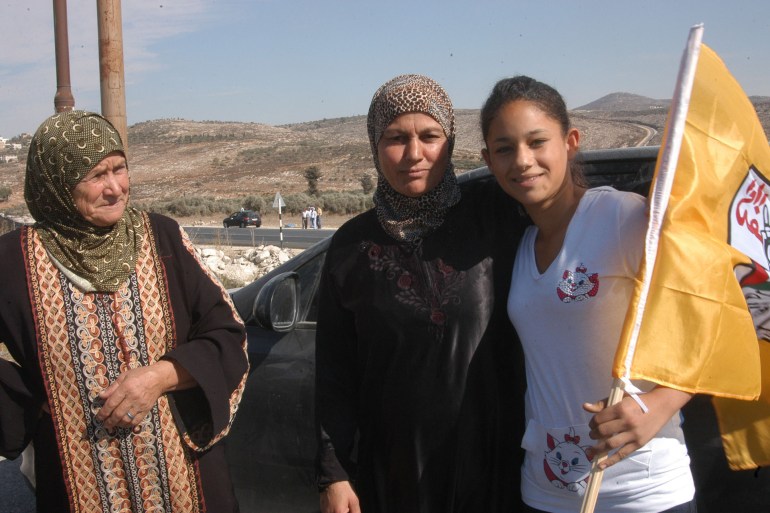Prisoner Walaa Tangier was released today through the “Al-Aqsa Flood”

Nablus- Twelve years ago today, under the same circumstances, Walaa Khaled Tangier, then 15, stood on Al-Quds Street near the Huwwara checkpoint in the south of the city. Next to her are her aunts and relatives. nablus north bank of the westAwaiting the release of her imprisoned mother, Latifa Abu Dhra, she was accompanied by dozens of female prisoners who were released as part of the Wafa Hurriyat Agreement (Shalit Agreement).
In August 2022, Vara was arrested at the Israeli “Eliyahu” military checkpoint near the city of Qalqiliya in the northern West Bank. She underwent harsh investigation and isolation in the Israeli “Petah Tikva” prison for 28 days. A prison sentence of about seven years was sought for the shooting, but the war in Gaza prevented the sentence from being approved.
Today, many years later, the same scene is repeated in abstract form and precise detail, as 27-year-old prisoner Walaa is released from Damon Prison in Israel after 15 months, where her mother is also released 12 years ago, also under an exchange agreement.
Poor release conditions
Due to the forced absence of her martyr mother, her persecuted brothers, and the difficult conditions of the war, Vara recalled with joy mixed with deep sadness the moment when her mother was liberated and Al Jazeera met her at that time, “Despite I hugged my mother during the long wait, and now I miss her, my brother, and everyone else I couldn’t see due to circumstances.”
As Walla told Al Jazeera, these conditions are not comparable to the conditions under which her mother was released due to Israeli violations against them, as prison authorities failed to inform them of their release and instead they stormed into their room and assaulted them. Conducting disgraceful searches and humiliating them with cruel and degrading descriptions.
Vara added: “We were only given four minutes to get dressed, so most of the female prisoners came out in light clothes and the prayer clothes we originally slept in to avoid sudden intrusions. Their hands and legs were in their Tied after being tied up.” Photos were taken without veils, fingerprints were taken, and most of the female prisoners were beaten, including me. ”
The occupying forces did not take into account their special needs as prisoners, especially that some of them were disabled prisoners and others were elderly, they refused to provide them with water and food and isolated them for 5 hours in their cells in Ofer prison close to city Ramallah They were trapped in the middle of the West Bank until they were released.

she was released barefoot
Not content with beating Vara, the guards tied her out barefoot and rode a bosta (prison bus) barefoot for dozens of kilometers from Damon prison to Ofer. She said: “I was received while I was barefoot, and my bare feet were bruised by my feet on the road in extremely cold weather.”
Before her release, prison guards summoned Vara and sent her a threatening letter, threatening to arrest her again and saying: “If your mother survived before, you won’t survive either.”
After nine years of detention and an estimated 35-year sentence, prisoner Latifa Abu Dara (Wala’s mother) was released under the Free People’s Loyalty Agreement in 2011, but she died of cancer and Died of cancer. She suffered from other chronic illnesses as a result of medical neglect at the Occupy Prison.

Brothers who are hurt by persecution
Not only was Wala deprived of the opportunity to see her mother, but the occupying forces’ pursuit of her brother, Mohammed Tangier (nicknamed “Al-Zanlouni”), also prevented her from seeing him, and she feared that she would not be able to see him or hug him What fate would have befallen him before.
Israel has been hunting Mohammed, who has been detained twice in the past two years, and considers him one of the most wanted men in the Balata camp. Israel has seriously injured him in several attempts to assassinate or arrest him, two of which resulted in his death. die. His arms and legs were almost completely paralyzed.
Adding to the pain of the freed woman Vara was not only the brutal occupation during the release, but also the punishment meted out to female prisoners since the beginning of the war, as they were gassed, humiliated and beaten, isolated, forbidden to meet and communicate with anyone, their Privacy was violated by male soldiers rushing into their area without warning.

Trying to deal with grief
Vara’s family tried to ease her grief as much as possible, so they set out early to pick her up at Ofer prison near Ramallah, but occupying forces arrested one of the children and detained him for several hours after beating him , thereby subduing them.
Walla’s sister Laila said: “On our way back, occupation soldiers detained us near the Zatara checkpoint south of Nablus and they almost shot us. We did not tell them that we were among There was one prisoner who was released because we were afraid of further repression.”
Laila added that her persecuted brother Mohammed was preparing to hold a large reception for Wala in the center of the camp, but a recent violent incursion by the occupying forces, which more than once attacked and destroyed their house, threatened to arrest their elderly aunt and Putting handcuffs on them prevented this, or allowed Mohammed to see Wala or contact her.
According to the Prisoner Service Bureau, the occupation forces hold approximately 8,000 Palestinian prisoners in its prisons, including approximately 350 children, in addition to approximately 90 women, 33 of whom were pre-War prisoners in Gaza.





